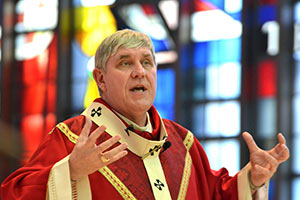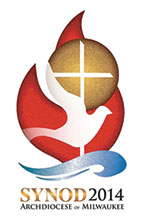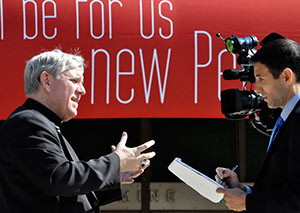Much like a tent revival, the recently concluded Archdiocesan Synod was a time when people came together to sing, pray and feel good about their faith, said Archbishop Jerome E. Listecki. In his homily at the synod’s closing Mass on Sunday, June 8, Archbishop Jerome E. Listecki encouraged participants to “ignite, renew and energize” their faith and take this renewed faith back to their parish communities. (Catholic Herald photo by John Kimpel)
In his homily at the synod’s closing Mass on Sunday, June 8, Archbishop Jerome E. Listecki encouraged participants to “ignite, renew and energize” their faith and take this renewed faith back to their parish communities. (Catholic Herald photo by John Kimpel)
The two-day synod, held at the Cousins Center involving 460 delegates, youth representatives and observers and 48 small group facilitators, left people, including the archbishop fired up, and enthused about their Catholic faith, he said.
Yet, after the revival ends, he said, the tent gets folded up and everyone returns to their normal routines.
“We want to avoid that,” he told the Catholic Herald in an interview in his office the morning after the closing of the synod. “We want to follow through on the initiatives and make a commitment, everybody from the delegates to the observers, to follow that course of renewed energy.”
Instead of folding up the tent, Archbishop Listecki wants participants to take the message of “ignite, renew and energize” your faith to their fellow Catholics.

“Looking over the synod gathering, it was very obvious people were – if you will – turned on by their faith and the ability to express love for their faith. Basically, it was a chance to make a difference,” he said, pointing to the flame used to depict the idea of Pentecost used in the synod logo.
“When we ignite the Spirit within, people are charged and on fire,” he said. “What the weekend did is renew the commitment we all made when baptized into the faith to come and practice the faith. Sometimes we take faith for granted and we live in a routine manner. This was an opportunity to pull out of our own comfort zone and renew our sense of commitment given to all of us at baptism — a renewal and witness of faith.”
The archbishop noted he was amazed at the level of intensity he observed among the people.
“What that says to me is there is a true hunger to live in faith, to profess the faith,” he said, adding that the synod empowered delegates to come together to feed that hunger.
The challenge now, said the archbishop, is to take what they experienced back into their parishes and “with the same type of energy, share that faith.”
“The Spirit has a way of bringing people to the fore, bringing people to the faith and that witness to the faith keeps me ignited,” he said, adding it’s important that he and others involved in the synod “keep faithful to the work of the synod.”
In the coming months, Archbishop Listecki will analyze the results of the synod, particularly the priorities that surfaced from the eight key areas of discussion and will write a synodal declaration that will determine the priorities for the local church for the next 10 to 15 years.
The archbishop explained that his declaration, to be issued Sunday, Sept. 14, the Feast of the Exaltation of the Holy Cross, will take into consideration the top two initiatives that surfaced in each key mission area, but may also address some of the other issues that may not have gotten the most votes, but are things he considers important.
 Archbishop Jerome E. Listecki is interviewed by a member of the local media on Sunday, June 8. (Catholic Herald photo by John Kimpel)
Archbishop Jerome E. Listecki is interviewed by a member of the local media on Sunday, June 8. (Catholic Herald photo by John Kimpel)
While much of the synod progressed as he hoped and expected, Archbishop Listecki pointed to one unexpected change mid-way through the process.
Delegates were given hand-held voting devices that they used for voting on the top initiatives in each of the key mission areas: liturgy, cultural diversity, evangelization, formation, Catholic Social Teaching, marriage and family, stewardship and leadership.
With the technology, the votes were readily tabulated, but synod organizers initially planned not to share the totals immediately, instead turning them over to the archbishop first.
“When I heard that, I said, ‘No, release the data. Let people see what they are voting for,’” the archbishop explained, stressing the importance of transparency in the process.
That change, he said, “was met with tremendous enthusiasm on the part of the participants and in that moment, it was clear to the delegates that we are not here to hide anything. We are not here to manipulate the voting. It was a spontaneous response and shows the confidence we place in this process.”
The weekend got off to a surprising start in the sense that mere hours before the opening Mass was to be celebrated at the Cathedral of St. John the Evangelist, Milwaukee, U.S. District Court Judge Barbara Crabb overturned a 2006 amendment to the Wisconsin Constitution outlawing same-sex marriage, in effect paving the way for same sex marriages in the state.
Blocks from where the synod’s opening Mass was being celebrated, same sex couples were being married in the Milwaukee Courthouse, after Milwaukee County Executive Chris Abele kept the courthouse open late to allow for the marriages.
Admitting that while the timing may have taken away from attention given to the synod, Archbishop Listecki said he found it interesting that the need for a strong campaign supporting marriage and family was one of the topics of discussion at the synod.
“Many people who came to the synod stressed the need for formation and information on the church’s teaching, reflecting strong support for it,” he said, adding, “The voice of the church reflects its teaching and a judgment by a federal judge is not going to change its teaching. The teaching remains the same: marriage is between one man and one woman.”
Looking ahead, the archbishop said he hopes that the intensity of the Spirit that was present and maintained itself during the synod will continue to ignite the church.
Speaking to the delegates in his homily at the closing Mass, he said, “That’s what I ask you, as delegates of this synod, to do. Help take this sense of a new Pentecost, to be ignited by the Spirit, to be renewed in your own personal, spiritual life and energize your community with the same sense, and devotion that you had and that I experienced through you in the last few days.”
“Do you feel the Spirit? Yes, I do, it’s present and is coming from the witness of your lives, your love for the church, the witness of your confidants to a world that sorely needs it,” he added.
